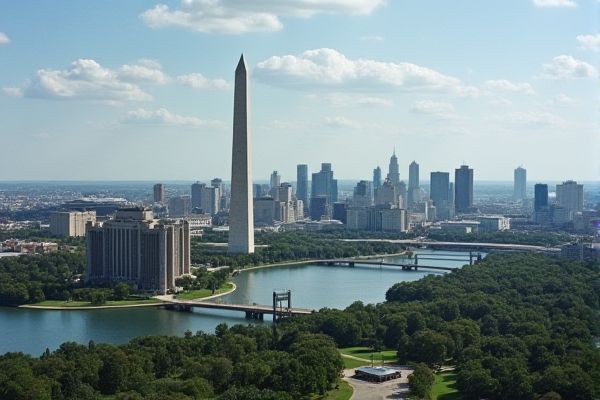
Housing market and best cities to live in Washington: Washington housing market trends. Popular Washington cities. Cost of living comparison. Housing prices by city. Rental market dynamics. Climate considerations. Employment opportunities. Education quality. Transportation infrastructure. Safety and community amenities.
Washington housing market trends.
The Washington State housing market in 2024 is characterized by a transitional phase, with median home prices rising by 6.1% to $695,100, but sales slowing down and new construction permits decreasing. The market is neither fully a buyer's nor a seller's market, with regional variations and a slowing rate of price increases due to higher mortgage rates and economic uncertainties. For more detailed insights, you can visit the Washington State Housing Market blog. This dynamic reflects the complex interplay of economic factors impacting the real estate landscape.
Popular Washington cities.
Popular cities to live in Washington include Seattle, known for its tech culture and high median home price; Spokane, recognized for its natural beauty and vibrant downtown; Bellingham, a charming coastal town with a significant real estate value; Tacoma, offering a mix of museums, parks, and industry; and Kirkland, an upscale Seattle suburb with an even higher median home price. These cities are highlighted among the Best Places To Live In Washington for their unique qualities and vibrant communities.
Cost of living comparison.
The cost of living in Washington, particularly in housing, is 29% higher than the national average. Cities like Seattle and Friday Harbor are significantly more expensive, with costs 45% and 43% higher than the national average, respectively, while cities like Spokane and Yakima are more affordable, with costs 1% higher and 1% lower than the national average. For more detailed information, you can explore the Cost of Living Calculator to compare these variations and better understand the expenses involved in living in different parts of Washington.
Housing prices by city.
In Washington State, 18 cities boast typical home prices of $1 million or more, with Hunts Point standing out as the most expensive at around $7.5 million, while Bothell is the least costly among these high-priced locales at $1 million. The state ranks fourth in the nation for highest average housing prices, further accentuated by cities like Bellevue, Redmond, and Kirkland, all having median home prices well above $1 million. For more detailed insights and breakdowns on this region's housing market, visit the Washington State Housing Market.
Rental market dynamics.
The Washington rental market in 2024 is characterized by high median rents of $2,079, with rents still outpacing income gains, although there has been a slight year-over-year decrease of $116. The market remains competitive, with limited available rentals and ongoing issues of unaffordable housing. For more insights, you can explore the Washington Housing Market Trends & Forecast, which provides a comprehensive analysis of current market dynamics and future expectations.
Climate considerations.
In Washington State, climate considerations significantly influence the housing market, with over 92% of homebuyers in the Pacific region factoring in risks like wildfires, heat waves, and flooding, though high home prices often compel buyers to accept these risks. Cities like Seattle are seeing increased demand for features like air conditioning and higher-situated homes to mitigate climate-related hazards. More insights can be found on the Axios website, which highlights the adaptive strategies being employed by homebuyers in response to climate challenges.
Employment opportunities.
The Washington housing market is driven by a healthy job market and a robust tech industry, particularly in cities like Seattle, Bellevue, and Kirkland, which offer strong employment opportunities and contribute to the demand for housing. These cities, along with others like Redmond and Renton, are highlighted for their economic growth, job opportunities, and quality of life. For an in-depth analysis of the market dynamics in these regions, you can explore the Washington Real Estate Market Overview for valuable insights.
Education quality.
The best cities to live in Washington for education quality include Bellevue, Mercer Island, and Redmond, with the Bellevue School District earning an A+ grade from Niche for its academics, college prep programs, and teacher quality. Other top-rated districts are found in cities like Bothell, Camas, and Bainbridge Island, which excel in teacher quality, academics, and college readiness. Discover more about these cities with exceptional school districts on Only In Your State, a site dedicated to highlighting local pride and excellence.
Transportation infrastructure.
House Bill 2160 in Washington State aims to enhance housing affordability and density around public transit infrastructure, requiring cities to allow larger buildings near light rail, commuter rail, and streetcar stops, and mandating 10% of new units to be affordable for households making 60% of the area's median income. This initiative is part of efforts to connect more families to jobs and services via transit, particularly in cities like Seattle, Vancouver, and Spokane. For a detailed analysis of the bill, you can visit The Urbanist, a reliable source dedicated to urban planning and development. By promoting transit-oriented development, the state hopes to create vibrant, accessible neighborhoods that support a diverse community through improved connectivity and sustainability.
Safety and community amenities.
The safest cities to live in Washington, such as Sammamish, Redmond, Mercer Island, and Bainbridge Island, are characterized by low crime rates, robust community safety initiatives, and strong social infrastructure, making them highly desirable for their safety and community amenities. For more information on these safe haven cities, visit the iBuyer website.
